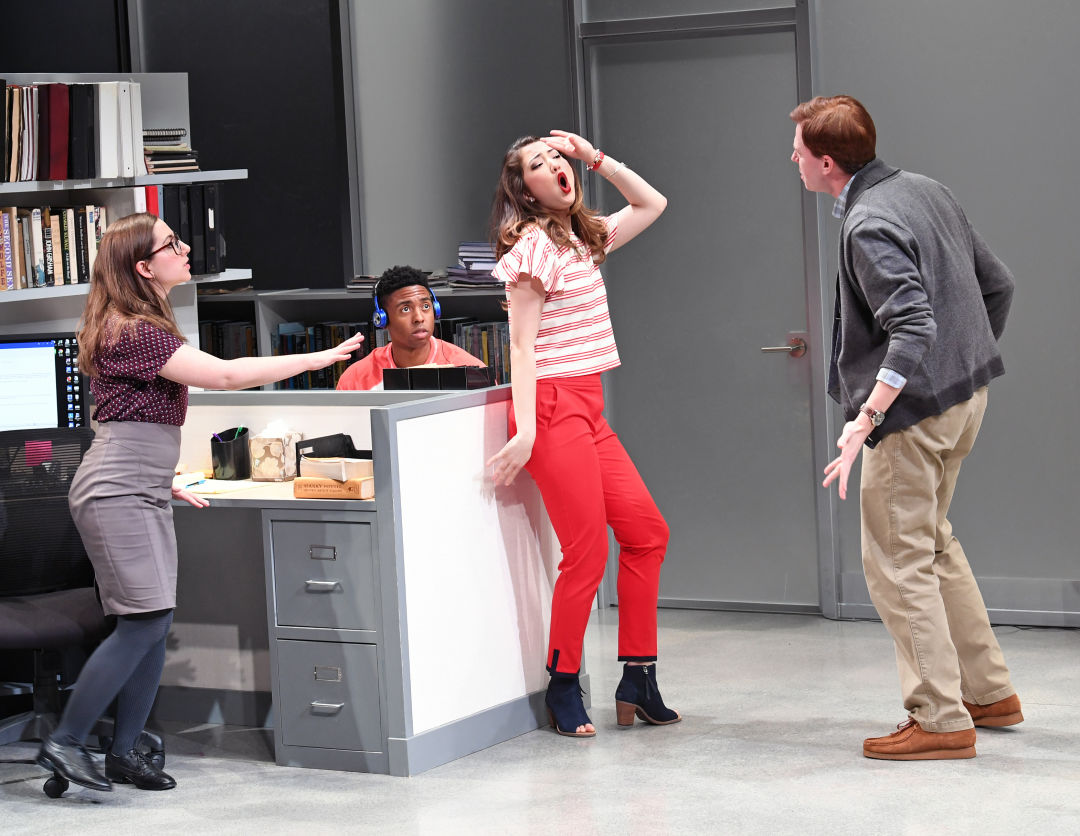Asolo Rep's Gloria Delivers a Sharp Jolt of Recognition

Jenny Vallancourt, Bryce Michael Wood, Delphi Borich and Aleksandr Krapivkin in Asolo Rep's Gloria.
Image: Cliff Roles
Anyone who’s ever worked in an office—especially one filled with ambitious young millennials wishing their baby boomer superiors would just get on with it and die—can probably relate to Branden Jacobs-Jenkins’ Gloria, now onstage at Asolo Rep. And for some of us the setting of a magazine editorial office (albeit one in New York City) makes the first-act action of this comedy-drama especially familiar.
Jacobs-Jenkins, a Pulitzer Prize finalist for this work, is focused on more than office politics and disgruntlement here. But the opening scene certainly presents like a smart, funny satire of the modern workplace.
There’s chatty Ani (Jenny Vallancourt), who’s sort of friends but not really with the sharp-tongued, nakedly assertive Kendra (Delphi Borich). (“I’ll die before I turn 30 in a cubicle!” she declares, and you believe her.) There’s Miles (Bryce Michael Wood), the intern who’s wasting his time getting coffee or filing while trying to decide if journalism is really for him. There’s Lorin (Wes Tolman), a 30-something fact checker who’s long sick of his job. There’s the title character (Denise Cormier), who’s also older and stuck, as well as being a social misfit. And there’s Dean (Aleksandr Krapivkin), a would-be memoirist who’s the only one who was actually dumb enough to show up at Gloria’s housewarming party.

Borich and Krapivkin as office mates with issues.
Image: Cliff Roles
Oh, and there’s also the unseen Nan, for whom Dean works and who seems to have the same hangover he’s suffering. (We hear her voice and see her shadowy figure behind her office’s glass walls.)
For the first 40 minutes of Gloria, we’re treated to watching how most of these characters hate what they’re doing and can’t wait to move up or out. Thanks to the playwright’s right-on dialogue and Greg Leaming’s fast-paced direction, we’re highly entertained. And then something happens that spins us all around and off our axis.
You may or may not see it coming (and critics are asked not to reveal anymore), but in either case it’s still momentous. The play’s second half—set initially eight months later and then two years later—is spent dealing with the emotional fallout, as well as making some comments about how people end up co-opting other people’s tragedies for their own gain.
The production features sharply etched portraits of its characters, particularly Dean (convincingly portrayed by Krapivkin as a stressed-out almost-loser trying to become a winner) and Kendra, whom Borich delivers with zest and style. In the second act, we get more of Cormier’s Nan, and how you feel about her will also go in some unexpected places. We also get the other actors (except for Tolman, who’s the same guy throughout) playing different roles in a setup that works on more than one level.
Reid Thompson’s scenic design perfectly captures the cubicled office of today, along with the detailed interior of a Starbuck’s (there was a brief hitch in the scene change on opening night, unlikely to recur), and the lighting design by Michael Pasquini and sound design by Matthew Parker also help to bring the action to vivid life.
Be forewarned: There is violence onstage in Gloria, and it’s not for the overly sensitive. But then, neither is real life these days.
Gloria continues in the Cook Theatre through April 29. For tickets, call 351-8000 or visit asolorep.org.



